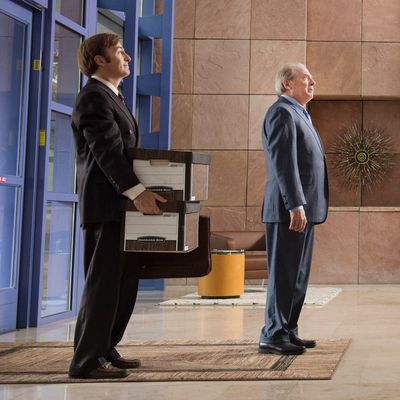
I guess we should have seen this coming: In a show driven by unpleasant contradictions, Jimmy’s biggest inspiration also turns out to be his biggest obstacle. I had a sense of Chuck’s power before, but watching him come through the doors at Hamlin, Hamlin, McGill to a standing ovation was — intentionally, I think — like watching a Roman emperor enter the Coliseum. Instead of a chariot, he rides shotgun in a Suzuki Esteem; instead of his ministry, he has his poor, dumb brother, carrying more cardboard boxes than he can handle.
After deciding that they don’t have the resources to fight Sandpiper’s lawyers, Jimmy and Chuck have come to HHM to make a deal. Jimmy only thinks he knows what’s on the table; that he doesn’t becomes the episode’s revelation. HHM agree to give him what amounts to a consultancy fee for bringing the case in, as well as a percentage of what HHM makes down the line — money that wouldn’t just make him solvent or comfortable, but rich.
But as we’ve been seeing, Jimmy has a proud and irrational streak: Once he finds out that Howard Hamlin doesn’t intend to actually let him work at HHM, Jimmy implodes and decides to withdraw the case entirely. The writing does go a little out of its way to have Howard dodge the question of why he won’t let Jimmy work at the firm, and lets us figure it has something to do with their personal vendetta. Hamlin has been a peacock for eight episodes now; there’s no reason to assume he isn’t being one now.
Jimmy’s troubles carry the narrative, but it’s an exchange between Mike and one of his “clients” — a pudgy, professorial man who hires Mike as a bodyguard — that provides the episode’s thematic anchor, and really, the anchor to the season so far, and what I imagine the show has in store.
The client has hired Mike on the occasion of selling some pills. He’s a scientist, maybe, or a quality-control person — in any case, not the kind of person who imagines himself standing in a dusty parking lot next to a factory exchanging drugs for money. (Cue your Walter White flash-forwards.) After the deal, which is with our beloved and taciturn Nacho, of all people, the two men get back in the car, and Mike gets his fee. Somewhere in the exchange, Mike uses a word the man isn’t prepared to hear: criminal. “Wait, I’m not a bad guy,” the man protests nervously. “I didn’t say you were a bad guy,” Mike says, “I said you were a criminal.” The man sits for a second, and then asks a question that both Saul and Breaking Bad have never explicitly asked but always invited us to think about: “What’s the difference?”
For all the accolades heaped on Gilligan et al for helping to create a new, richer kind of television, there are moments in Saul — and in Breaking Bad, too — that feel very old, masculine, almost biblical: two brothers, turned on each other; a good man forced to make a difficult decision; morality plays about the pitfalls of pride and envy. No surprise that when we find out that it’s Chuck who told Howard Hamlin not to hire Jimmy, it’s in part because he thinks the law is sacred, as though he lived under divine mandate to protect it. “You know I’m right!” Chuck shouts at Jimmy, who, like us, can barely believe what he’s hearing. But as the show points out, right and wrong aren’t always opposites, and sacred is a pretty old-fashioned word.

